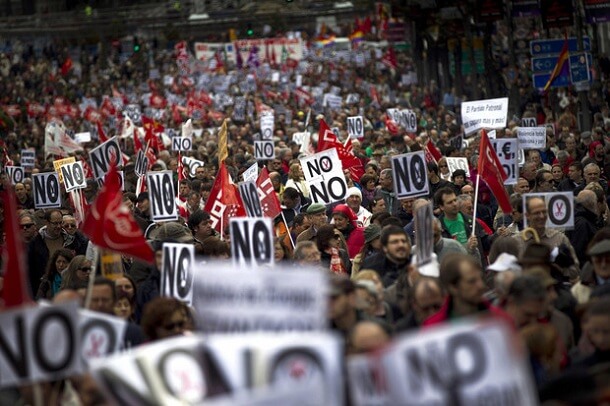On Wednesday, workers across Greece mobilized in a one-day strike called by the trade unions against new austerity measures dictated by the European Union and imposed by Greece’s Syriza (Coalition of the Radical Left) government.
The 900-page bill prepared by the EU and Syriza contains yet another cut to pensions, ranging from 9 to 18 percent depending on the pension; the imposition of income taxes on anyone making over €5,681 per year; cuts of up to 50 percent in state financial aid for heating, unemployment insurance, and other programs; measures to facilitate mass sackings; and more privatizations of public enterprises. The accord also reportedly contains promises by Syriza to introduce laws to limit the right to strike and facilitate the banning of strikes.
It is a further stage in the betrayal by Syriza of all the promises it made to the Greek people when it came to power in January 2015 to put an end to EU austerity. Prime Minister Alexis Tsipras declared Wednesday that the new measures would unleash a “tsunami of investment,” presumably because capital would be attracted by the prospect of hiring super-exploited Greek workers paid wages comparable to those of workers in China.
Among Greek workers, however, anger is rising against Syriza. Large sections of the working class adhered to the strike call. Trains, buses, Athens mass transit and public hospitals were all on strike or working with skeleton crews on reduced hours. Air traffic controllers struck for four hours Wednesday and will do so again on Thursday.
Tens of thousands of people marched in several protests organized in Athens by the different trade union bureaucracies—the ADEDY public-sector workers union, the GSEE private-sector union, and the PAME union linked to the Stalinist Greek Communist Party (KKE).
The Panhellenic Federation of Sailors union announced the extension of a strike initially called for Tuesday and Wednesday through to Friday. In a statement, it asked for “the understanding and full support of both the travelling public and all Greek workers,” explaining that the new cuts would expose sailors “to poverty and destitution.” Their strike affects, in particular, the Greek islands, halting ferries and isolating the islands from the mainland.
In Thessaloniki, Greece’s second city, mass transit workers continued a strike they launched on Monday. The 2,300 Thessaloniki Public Transport (OASTh) workers are demanding the payment of back wages for March and April 2017. Management is still refusing this demand and has called on the courts to ban the strike. OASTh management lost its first court case however, when a lower court ruled that its suit had no juridical foundation and delayed the next hearing on the matter to September 26.
A tense confrontation unfolded in the streets of Athens between on-duty riot police and uniformed strikers, including firemen, soldiers and policemen, whose so-called “special salaries” system is under attack in the current legislation. At noon, forces from trade unions representing the police, the soldiers and other security forces occupied the General Accounting Office and demanded to see Alternate Finance Minister George Chouliarakis.
They also deployed a banner asking Tsipras in Greek, and German Chancellor Angela Merkel in German, “How much is the life of a Greek policeman worth?”
They also marched on the parliament, where parliamentarians from Syriza and other parties were debating the bill. Three squads of on-duty riot police blocked them at the Vasilissis Sofias entrance to the parliament to keep them from storming the building.
However, a number of individuals, including union officials and leaders of various professional associations, managed to enter the building and denounce Syriza parliamentarians discussing the bill. Cries rang out of “Have you no shame?” “You have nothing to do with the Left,” and “You’re selling out everything!”
One ADEDY member confronted former Syriza Labour Minister Giorgios Katrougalos, citing his promises when Syriza came to power that no further cuts would be made to pensions. A leader of the Greek union of disabled persons denounced Syriza for cutting social assistance, and representatives of the soldiers and police unions denounced the impoverishment of their members and Syriza’s betrayal of its election promises to the Greek people.
Responsibility for the acute political crisis that is emerging in Greece lies above all with the reactionary role of Syriza. In 2015, under conditions of economic collapse and mass unemployment, with the dead end of Greek and European capitalism plainly evident after six years of deep austerity, the party promised to end austerity while desperately seeking a deal with the EU. Syriza refused to make any broader appeal to the European working class to support Greek workers against the EU’s threats to cut off credit and bankrupt the country.
There was unquestionably a powerful objective basis for such a revolutionary policy. A year after Syriza came to power, a mass movement of workers and youth erupted in France against the Socialist Party (PS) government’s reactionary labour law. A more recent Europe-wide poll of youth, titled “Generation What,” found that a majority of European youth would be willing to participate in a large-scale uprising against the existing governments.
Syriza rejected such a policy and worked feverishly in the interests of the Greek capitalist class. It quickly repudiated its promise to end the EU austerity Memorandum with Greece and organized a referendum on EU austerity in July 2015, hoping to obtain a popular vote for austerity to justify a capitulation to Brussels. When the Greek people voted against austerity, Syriza ignored the “no” vote and began implementing harsh EU austerity measures to uphold the euro and Greece’s ties to the EU and the NATO military alliance.
From an article by Alex Lantier published in wsws.org











